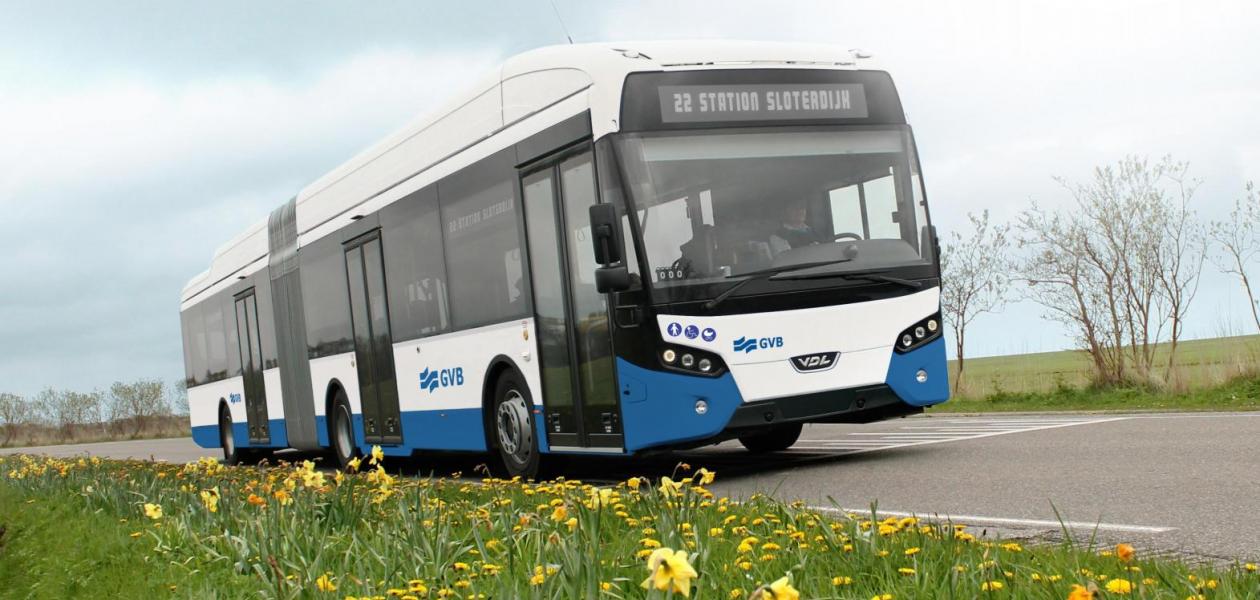31 electric VDL Citeas for urban transport in Amsterdam

On 12 December, Amsterdam's public transport company GVB and VDL Bus & Coach signed the contract for delivery of 31 electric Citeas, with the option for 69 extra electric buses. VDL Bus & Coach is also responsible for implementation of the charging infrastructure. The 31 vehicles will be used for urban transport in Amsterdam. The project was realised through close cooperation between Transport Region Amsterdam, as the grantor of the concession, the Municipality of Amsterdam, GVB and VDL Bus & Coach.
President and Chairman of the Board Willem van der Leegte of VDL Groep said, “We are very proud that through the delivery of our electric public transport buses we will contribute to further CO2 reduction in the city and thus a cleaner Amsterdam. GVB's ambitions to provide electric service are perfectly aligned with those of VDL to make a significant contribution to the electrification of bus transport in the Netherlands. It is, of course, especially pleasing to be supplying electric buses to our capital city. This renewed cooperation with GVB symbolizes the mutual trust between our organizations.”
Alexandra van Huffelen, managing director GVB, said, “This is the first step towards making our bus fleet more sustainable. I am proud that our first 31 electric buses from VDL will now be arriving. As an urban transport operator, taking this step means we are contributing to cleaner air in Amsterdam and the reduction of our own CO2 emissions. In the coming years we will replace our entire bus fleet, some 200 vehicles, with zero emission buses that we can use to transport our passengers comfortably and cleanly.”
Deployment on city lines in Amsterdam
From 2020 the electric Citeas will be in service on lines 15, 22 and 36, all with start and end points at Sloterdijk station. They will replace part of the current diesel fleet. The series of 31 electric buses
consists of 9 Citeas SLF-120 Electric and 22 articulated Citeas SLFA-180 Electric. Both types of vehicle have a similar design and meet the requirements set by GVB for efficient bus operation in the city centre.
Latest battery technology
The electric Citeas for GVB are equipped with a roof pantograph and the latest battery technology.
Operational availability of the electric buses has been maximized through an optimized rapid
charging concept. The articulated vehicles, the Citeas SLFA-180, will be equipped with a 288 kWh battery system, and the Citeas SLF-120 will get a 216 kWh battery pack. When in scheduled service, the buses will be recharged with seven rapid chargers at Sloterdijk station. During the night the batteries will be fully recharged with 31 slow chargers at GVB's Garage West location.
VDL Citea Electric
GVB already has the diesel version Citea Low Floor operating in scheduled service. This low-floor bus is ideal for heavy city use with high passenger numbers, as in Amsterdam. The articulated Citea Electric for GVB has 47 seats, and the 12-metre Citea is fitted with 31 seats. GVB will use 100% green electricity to charge the buses, so the electric Citeas will run completely emission-free. An additional advantage is that they are much quieter than diesel buses. In addition to improving air quality by reducing CO2 emissions, this also means reducing noise pollution, which contributes to a better living environment. The climate system is equipped with a heat pump. This modern climate control technology ensures a high level of passenger comfort. The bus connectivity platform in the buses ensures closer monitoring of battery capacity and efficiency by collecting and transmitting relevant, operational data.
GVB
GVB is the public transport company for Amsterdam. Every day about 843,000 people travel by GVB, in the metro, tram and bus and on the ferries across the IJ and the North Sea Canal. The aim of GVB is to transport passengers safely, hospitably and on schedule. The starting point is that they should feel comfortable, informed and appreciated. GVB uses all its experience to be a fully- fledged mobility partner for the city and the region. Together with various parties, GVB works continuously to provide an inviting, accessible and sustainable public transport network.

